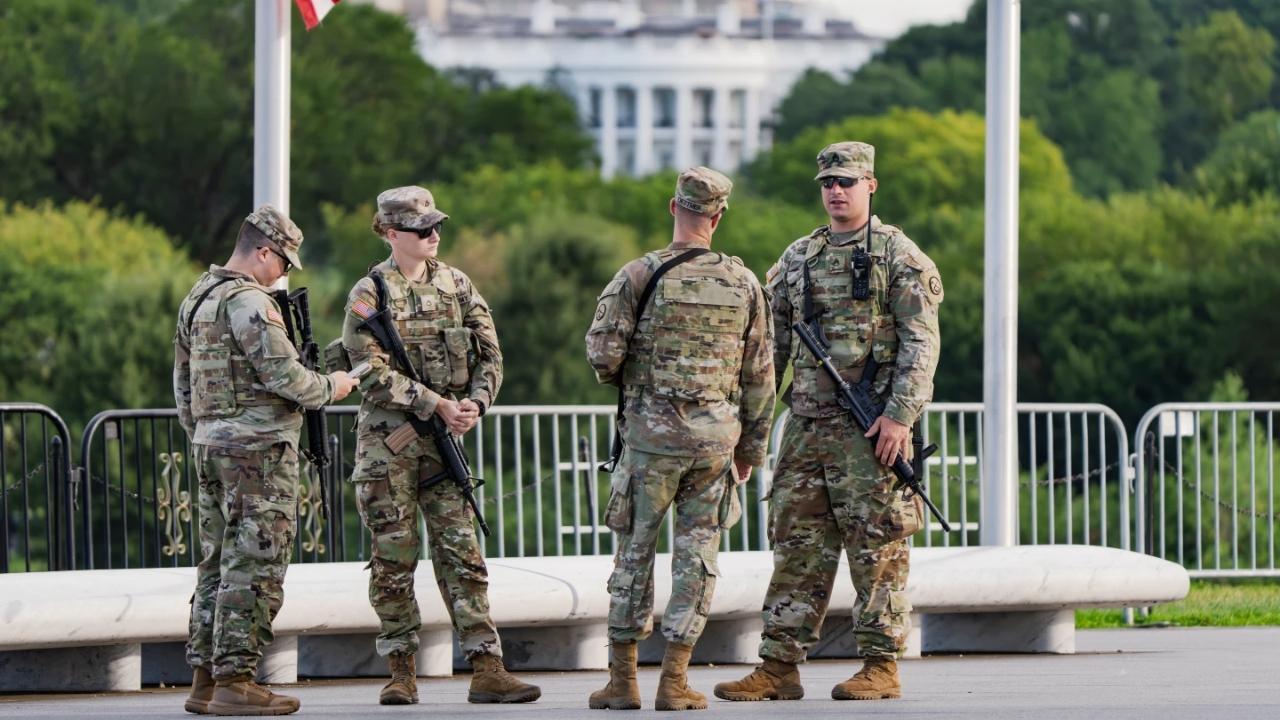
Post by : Monika
Photo: AP
In 2025, President Donald Trump ordered the deployment of National Guard troops to several US cities, including Washington, D.C., and Los Angeles. His goal was to help reduce crime, control homelessness, and support immigration enforcement. This decision created a lot of discussion and controversy across the country.
What Happened in Washington, D.C., and Los Angeles?
In mid-August 2025, around 2,000 National Guard troops were sent to Washington, D.C. Some troops came from D.C. itself, while many others arrived from states like Texas. The troops were allowed to patrol tourist areas with weapons but did not patrol high-crime neighborhoods. The government also took temporary control of the D.C. Metropolitan Police Department for 30 days.
The President said this helped make the city very safe and called it a "miracle," pointing out that there was a whole week without a murder. However, many local residents and leaders did not agree. Nearly 80% of Washingtonians said they did not want the troops there. Over 700 arrests were made, and many guns were taken off the streets.
In Los Angeles, earlier in 2025, Trump sent 700 Marines and 4,000 National Guard members. This happened during protests against immigration raids. California’s Governor Gavin Newsom strongly opposed the move, saying it violated the law. The deployment faced court battles, with California arguing that the President could not send the military to police the city.
What Are the Plans for Other Cities?
Trump also talked about sending troops to Chicago, Baltimore, New Orleans, New York City, and Oakland. Chicago was the next city he planned to send troops to, calling it a "mess" and claiming residents wanted help. But local officials disagreed, saying crime had gone down in Chicago, with fewer homicides and shootings than the year before. No official requests for the troops had come from Illinois leaders.
In Baltimore and New York, officials also pushed back. They said crime was decreasing and questioned why the federal government wanted to send troops. Some governors warned that the President’s actions could cause more harm by increasing tension between communities and law enforcement.
Legal and Political Concerns
Many leaders said this use of the military inside cities goes against the law. The Posse Comitatus Act generally stops the military from acting as police within the United States, except in emergencies like insurrections. To send troops without state approval, the President might have to declare emergencies or use special laws like the Insurrection Act, which is very controversial.
In California, a federal judge ruled that Trump’s military action in Los Angeles was illegal. The judge banned the military from doing police work such as arrests or searches in the state. The government can appeal this decision, but it has caused significant challenges.
Several mayors and governors, especially Democrats, have called the actions "authoritarian" and said they violate people’s freedoms. Chicago’s Mayor Brandon Johnson warned that soldiers in the city could increase tensions. Illinois Governor JB Pritzker called the move a “power grab” and said no emergency justified it.
What Do People Think?
Many residents in the cities with troops said they felt unsafe or upset by the military presence. Thousands marched in Washington, D.C., to protest, saying the troops made them feel like the city was under occupation. Some support the troops, believing they have helped reduce crime in tourist areas. Others worry the troops do not have proper training to handle community policing and may make situations worse.
In D.C., the Mayor agreed to let federal law enforcement work with local police but wanted the troop mission to end soon. She pointed out that crime had been dropping even before the troops arrived.
What About Immigration Enforcement?
Along with the National Guard troops, federal Immigration and Customs Enforcement (ICE) agents have increased their activity, especially in cities like Chicago and Los Angeles. These agents focus on finding and deporting undocumented immigrants. Their presence in neighborhoods has also caused worry among immigrant communities.
These immigration actions are separate from the National Guard’s crime-fighting missions but happen at the same time. Local leaders say these aggressive immigration raids make trust between communities and law enforcement worse.
National Guard










Alibaba Cloud Leads China’s AI Market with 36% Share
Alibaba Cloud captured over one-third of China’s AI cloud market beating rivals and investing billio

Cambodia Defends China’s Belt and Road as Economic Lifeline
Cambodia praises China’s Belt and Road projects, calling them vital for growth rejecting claims of d

Portugal Norway England shine in UEFA World Cup qualifiers
Portugal beats Hungary 3-2 Ronaldo scores Haaland shines for Norway, Kane leads England in dominant

PV Sindhu exits Hong Kong Open HS Prannoy Lakshya Sen win
PV Sindhu loses early at Hong Kong Open HS Prannoy and Lakshya Sen advance in tough battles India's

Iran Signs New Cooperation Deal with UN Nuclear Watchdog in Cairo
Iran agrees to a new framework with UN nuclear agency resuming controlled inspections after June’s c

Syrian man found guilty for deadly festival stabbing in Germany
A Syrian man inspired by IS was convicted for stabbing people at a German festival, killing three an